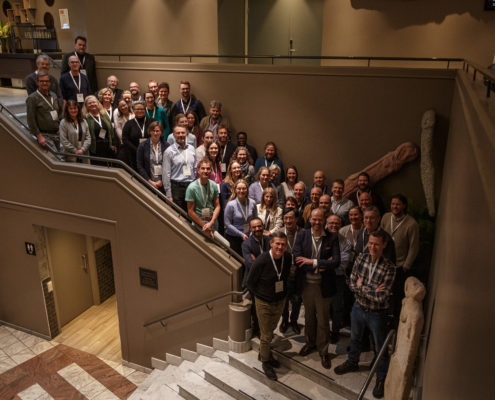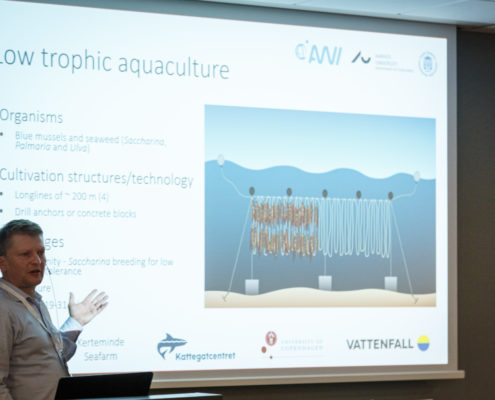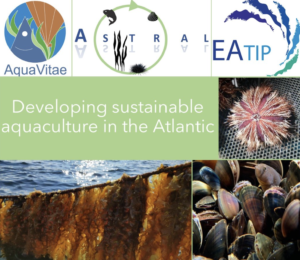OLAMUR – a new EU funded project addressing aquaculture and renewable energy.
EATiP are delighted to be participating in a new EU Mission Ocean Lighthouse project, considering the integration of aquaculture production with renewable wind energy in marine multi use sites.
The OLAMUR project, running from January 2023 to December 2026 will engage 25 partners across European industry and research organisations who will work together to farm kelp and mussels at three pilot sites in Europe: two existing offshore wind farms and one fish farm that produces rainbow trout.
The Institute of Marine Research (IMR) in Norway is leading the project, whilst EATiP will take responsibility for leading on communication and dissemination activities.
The offshore wind farm Kriegers Flak in Kattegat is operated by the swedish company and project partner Vattenfall. This is one of the sites for kelp, mussels and artifical reefs. Photo: Vattenfall
The project is due to receive total European Union funding of €8,2 million over the course of the four year project duration.
“The OLAMUR project is a prime example of the way we have to work to solve the big problems of our time. It is not only an interdisciplinary, international scientific effort, but a lighthouse project which is set to provide specific, sustainable solutions for actual industries – today”, noted Nils Gunnar Kvamstø, Director of IMR, during his welcome address to project partners at a kick off meeting hosted by IMR in Bergen, Norway. “In this case, how can you combine energy production and sustainable food production, while perhaps also providing services to the ecosystem?”
The project will investigate several aspects of this, such as:
- Practical solutions to the challenge of farming in exposed offshore environments.
- Will the kelp/bivalves produced be safe to eat? (For example, concerns have been expressed about microplastics and hydraulic fluid from wind turbines)
- Potential carbon storage and habitat enhancement from farming kelp/bivalves.
- Legislation and regulation (including considering bureaucratic barriers to co-location and MSP?)
- In practice, wind farms can act as reserves for fish and other animals, since fishing is prohibited – can this type of reserve benefit some species, fisheries and aquatic ecosystems?
- Can we improve the habitat for fish and other animals by creating artificial reefs there?
As a “lighthouse” project the work will contribution to a number of EU policy priorities including working towards the 2030 Mission Ocean goal of restoring oceans and waters through research, innovation and blue investment.
The project is based in the Baltic basin, but seeks to benefit other EU and international basins through knowledge and innovation transfer. In many states, the offshore wind industry and marine multi use sites are only in the early stages of development. The project will also contribute in discussions surrounding the increasing emphasis on Marine Spatial Planning and engage with the EU MSP Platform.
The project partners in the various work packages are now in the planning process. Project partners include:

Project parnters attending the project kick off meeting in Bergen, Norway in January 2023. (Photo: Erlend A. Lorentzen / IMR)
- The Institute of Marine Research
- Alfred Wegener Institute Helmholtz Centre for Polar and Marine Research
- Danmarks Meteorologiske Institut
- Aarhus Universitet
- GCF – Global Climate Forum EV
- Helmholtz-Zentrum Hereon
- Maritime Robotics AS
- Vattenfall Europe Windkraft AS
- Kattegatcentrets Driftsfond
- Skarv Technologies AS
- SINTEF Ocean AS
- WindMW GmbH
- Kerteminde Seafarm Aps
- Lerøy Seafood Group ASA
- RedStorm OÜ
- Tartu Ulikool
- Danmarks Tekniske Universitet
- Ösel Aquafarm OÜ
- Köbenhavns Universitet
- Stiftelsen Voice of the Ocean
- ETT Spa
- Klaipedos Universitetas
- EATiP ASBL
- Nordfriesische Seemuschel GmbH
- Wyk 8 Muschelfischereibetrieb GmbH
At the pilot facilities in Denmark and Estonia, equipment will probably be put into the sea this year, with Germany following in 2024.

”There are no off the shelf solutions for the type of aquaculture we are about to do. We have to develop the solutions from scratch, tailored to meet the local conditions” – Bela H. Buck, Professor at the German Alfred Wegener Instiute, leading the work package which looks at the farming itself. (Photo: Erlend A. Lorentzen / IMR)
Project communication and dissemination tools are currently being developed including a project website, communication and dissemination plan and social media contacts. Look out for futher details coming soon! Please see here for further contact details on the project.

